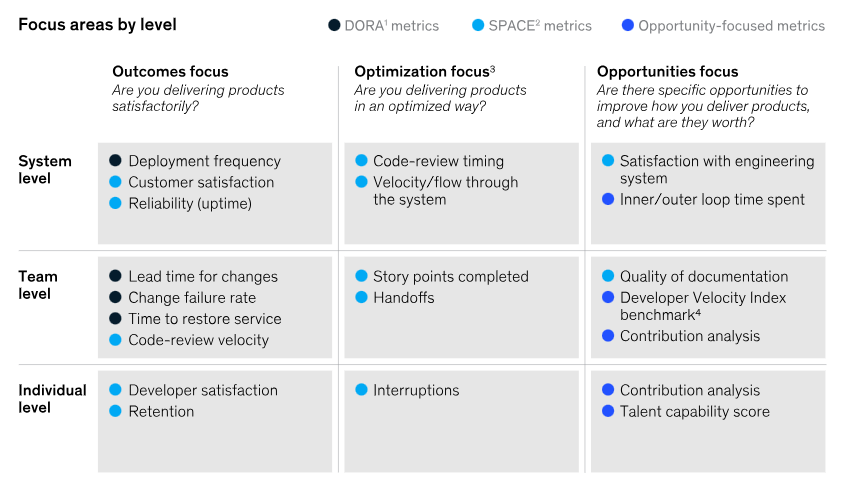No McKinsey, You got it all wrong about developer productivity!
Disclaimer: I have been an enormous proponent of Developer Productivity and have tried to implement automated metrics collection in 3 orgs with varied success. In my Mentoring sessions with early-stage startup leaders as well, I (re)enforce the importance of being aware of Dev Productivity. So much so, that I have written a 2-part article on the same here, here and here. I have also been a huge fan of McKinsey and how they seem to get answers which eluded the attention and resources of mega-corporations or governments alike. However, this article is written to communicate an entirely different perspective. In my opinion, McKinsey has got this entire “framework” thing about “dev productivity” wrong.
Introduction:
About a month back, McKinsey published an article claiming that they have developed a framework to measure productivity. They also acknowledged the fact that they were simply rehashing some of the existing metrics (like DORA and SPACE), which were used by Engineering Leaders and have simplified it (without the context) and are pitching it to their traditional buyers, the C-Suite executives in Mega corporations. Actually, some of these metrics can be useful tools if used correctly -One example is Hand-offs. But, the main reason I have chosen to write this article is their central focus seems to be “Coders should code”. It also appears to have A) missed the context of every metric, OR B) Omitted the context so as not to burden their target audience.
Finally, there is a mix-max of things to track, metrics to monitor and Opportunities to Focus, which looks like


Captain Ramius Pointing to a young Jack Ryan that Admiral Halsey was Stupid!
The Legendary Kent Beck has written a deep 2-part piece on countering the conjectures presented by McKinsey and elaborating on the gaps that engineering orgs are traditionally bound to manifest. It is very well written and covers almost everything. There are also a bunch of other eminent Software Engineers who have written on this and I have tried to give a quick lot at the bottom of this article.
What Was I concerned about?
Focus On Activities
I was primarily concerned about the lack of focus on Outcomes and Impact and a focus on the “Activities” in the proposed framework!
Any engineering leader or manager will tell you that Code Review Velocity and Deployment Frequency have nothing to do with measuring outcomes. While I will not discount Cycle Time or MTTR (I take pride in building multiple teams with one of the lowest MTTR and Cycle times in the ecosystem). They are indicators of some process elements/activities that could lead to outcomes. If we want to measure something, it should be Outcomes, not activities!
Focus on Optimisation of Irrelevant Metrics
Code Review Velocity:
If you want to time-motion the code review process in the entire stream map, you’ll find that async code review is killing your productivity. Pairing improves that dramatically. Instead of trying to sub-optimize for code review, measure the thing we actually want to improve. Which will be “Cycel Time”.
Story Points Completed:
Let’s agree on a basic fact. A “story point” is a made-up number. It was conceived as yet another way to obfuscate estimates for thought work that is difficult to estimate. As originally conceived, it represented the number of mythical “ideal days” of effort. There’s so much time wasted on getting better at “story pointing,” arguing about the Fibonacci sequence, “planning poker,” and other story point nonsense. Frankly, it is one of the “Bad” elements of Scrum! As a leader, you should find and remove handoffs and wait times. Story points are useless for anything and even more useless for this goal. Track throughput instead.
Handoffs:
This is a good one. Good job, McKinsey. You got something right. Stop using testing teams, use pairing instead of code review, operate what you build, and don’t have any people doing anything manual to the right of development.
Contribution Analysis and Opportunities focus
In the other focus areas, they have listed metrics at the individual level that can be useful unless you measure “developer satisfaction,” “retention,” and “interruptions” at the individual level. These should only be measured in aggregates to prevent any cognitive bias. IMO, Things start getting really toxic in the “Opportunities focus” section, though.
I have been part of organisations and processes where there was a focus on tracking and measuring the outcomes of individuals. It did not play out well, ever. My Conclusion after reading the article for the second time is that McKinsey thinks their intended audience (CEOs and CFOs) cannot understand “systems thinking.” Now, If you roll out this or a similar framework and announce this and what do you think will happen?
You have a group of people all working on the same backlog but not acting as a team. Code review suffers, mentoring sufferers, pairing is hard, work breakdown suffers, etc. Anything that requires more than one person to conduct/conclude, including helping someone get unstuck, will get deprioritised!
Overall, The inferences seem to be based on hard facts, but the conjectures are all flawed.
Why This Now?
At this point, I want to highlight what “Triggered” me to write this, read the following.,
For example, one company found that its most talented developers were spending excessive time on noncoding activities such as design sessions or managing interdependencies across teams. In response, the company changed its operating model and clarified roles and responsibilities to enable those highest-value developers to do what they do best: code.
McKinsey’s Article on the purported Framework
Wow. I pray for that company.
So, I believe after McKinsey pointed to the fact, that developers are involved in irrelevant things like design, architecture etc. They created separate towers of responsibility for design. In that case, I am puzzled about who will be responsible for the minor things like dependency management, prerequisites, versioning, capacity planning, concurrency, scalability etc.
Did they get anything Right?
Yes. There are tonnes, but they are buried at the bottom. Their focus on Hand-offs and cycle times are really worth tracking in any engineering org. To the authors’ credit, they have also identified some of the core issues with measuring Developer Productivity. But, someone higher in the firm seem to have suggested to soften the blow. So, they have diluted and buried those sections. I will share 2 gems here.
To truly benefit from measuring productivity, leaders and developers alike need to move past the outdated notion that leaders “cannot” understand the intricacies of software engineering, or that engineering is too complex to measure.
The real problem is that in many large organisations, “The Management” doesn’t understand the work they manage. Management can understand the intricacies of software engineering if they become leaders and study the work they manage. In a large behemoth, not all managers are leaders. They want a framework and will enforce it with an iron fist. Now, McKinsey has delivered them a framework!
Learn the basics. All C-suite leaders who are not engineers or who have been in management for a long time will need a primer on the software development process and how it is evolving.
This one Nailed it! The primary reason “Management” finds it difficult to measure the right thing is because they sometimes do not understand the work they want to measure. Leaders who understand do measure the right things. My primary concern with this framework is, in trying to solve this, McKinsey has made the problem worse!
Just google “McKinsey developer productivity” and you’ll find more articles on how this framework is flawed than the original article link!
References & Further Reading/Watching:
1, Mc.Kinsey Article – https://www.mckinsey.com/industries/technology-media-and-telecommunications/our-insights/yes-you-can-measure-software-developer-productivity
2, Kent Beck’s rebuttal – https://newsletter.pragmaticengineer.com/p/measuring-developer-productivity
3, Redidit – https://www.reddit.com/r/programming/comments/1650595/measuring_developer_productivity_a_response_to/
4, Level Up Coding – https://levelup.gitconnected.com/the-developers-productivity-can-t-be-measured-in-mckinsey-s-way-an-analysis-4d81924279ae
5, Measuring Developers Productivity… McKinsey what’s the point? – https://www.youtube.com/watch?v=wjQn8nnkXTs
6, Can We Measure Developer Productivity? A Reaction to McKinsey’s Article – https://www.youtube.com/watch?v=ETa24ErdcwQ
7, HOW TO MEASURE ENGINEERING PRODUCTIVITY? – https://nocturnalknight.co/2022/11/how-to-measure-engineering-productivity/
8, Business Value delivery by Engineering Teams in StartUps – Part 1 – https://nocturnalknight.co/2021/10/business-value-delivery-by-engineering-teams-in-startups-part-1/#comment-773
9, Business Value Delivery by Engineering Teams in StartUps – Part 2 – https://nocturnalknight.co/2021/10/business-value-delivery-by-engineering-teams-in-startups-part-2/
10, Space Metrics – https://www.harness.io/blog/space-metrics-get-started
11, DORA Metrics – https://www.leanix.net/en/wiki/vsm/dora-metrics
12, Dave Farley’s Response To The NONSENSE McKinsey Article On Developer Productivity – https://www.youtube.com/watch?v=yuUBZ1pByzM

